

Jonathan Haidt: Reasons Do Matter. The Stone is a forum for contemporary philosophers and other thinkers on issues both timely and timeless.
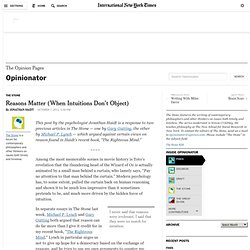
This post by the psychologist Jonathan Haidt is a response to two previous articles in The Stone — one by Gary Gutting, the other by Michael P. Lynch — which argued against certain views on reason found in Haidt’s recent book, “The Righteous Mind.” Among the most memorable scenes in movie history is Toto’s revelation that the thundering head of the Wizard of Oz is actually animated by a small man behind a curtain, who lamely says, “Pay no attention to that man behind the curtain.” Modern psychology has, to some extent, pulled the curtain back on human reasoning and shown it to be much less impressive than it sometimes pretends to be, and much more driven by the hidden force of intuition. I never said that reasons were irrelevant.
In separate essays in The Stone last week, Michael P. Leif Parsons One of the issues I am most passionate about is political civility. After the Election, Fear Is Our Only Chance at Unity. Shared fear can help.

A Bedouin proverb says, “Me against my brother, my brothers and me against my cousins, then my cousins and me against strangers.” Human beings are pretty good at uniting to fight at whatever level is most important at a given moment. This is why every story about a team of warriors or superheroes features an internal rivalry, but all hatchets are buried just before the climactic final battle in which the team vanquishes the external enemy. A national election focuses our attention on a single level of competition — political party versus political party. Let’s call that “me and my brother against our cousin.” Except that we didn’t do it four years ago, when things looked even grimmer, and there’s no sign that we’re going to do it now. We the people bear some of the blame for what’s happened in Congress, for we, too, have become more angrily partisan.
One way is to focus on common threats, rather than on common ground, just as the Bedouin proverb suggests. Rousseau, Discourse on the Sciences and the Arts. Jean Jacques Rousseau Discourse on the Origin and the Foundations of Inequality Among Men [This translation, which has been prepared by Ian Johnston of Vancouver Island University, is available for general use but has some copyright restrictions.
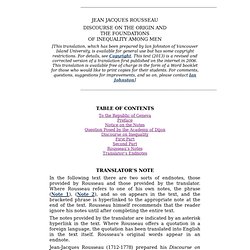
For details, see Copyright. Why Are States So Red and Blue? The Stone is a forum for contemporary philosophers and other thinkers on issues both timely and timeless.
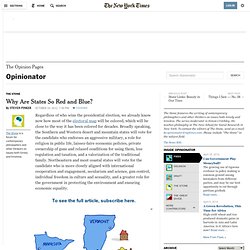
Regardless of who wins the presidential election, we already know now how most of the electoral map will be colored, which will be close to the way it has been colored for decades. Broadly speaking, the Southern and Western desert and mountain states will vote for the candidate who endorses an aggressive military, a role for religion in public life, laissez-faire economic policies, private ownership of guns and relaxed conditions for using them, less regulation and taxation, and a valorization of the traditional family. What Tea Partiers Really Want. Profile on TED.com. Jonathan Haidt: The moral roots of liberals and conservatives. Republicans Or Democrats: The Choice Comes Down To Competing Myths : It's All Politics. Hide captionWhat does your vision of America look like?
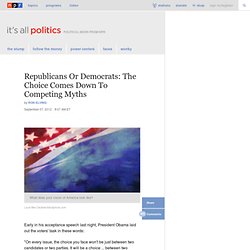
Loud Red Creative/iStockphoto.com What does your vision of America look like? Early in his acceptance speech last night, President Obama laid out the voters' task in these words: "On every issue, the choice you face won't be just between two candidates or two parties. It will be a choice ... between two fundamentally different visions for the future. " It's a thought that emerges often in the Obama campaign, the idea of 2012 as a watershed election — "a hinge of history," as Vice President Biden called it at the convention in Charlotte, N.C.
"So here we stand," said GOP nominee Mitt Romney. To some degree, all president elections might claim such historical significance. The Psychology of Happiness. The Happiness Hypothesis - Jonathan Haidt. Jon Haidt's Home Page. Robert Wright Interviews Jonathan Haidt. Comedy Cellar Podcast: Jonathan Haidt.
A Vote for Reason. The Stone is a forum for contemporary philosophers and other thinkers on issues both timely and timeless.
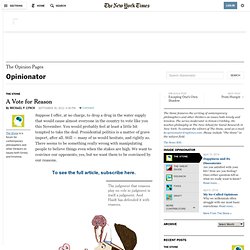
Suppose I offer, at no charge, to drop a drug in the water supply that would cause almost everyone in the country to vote like you this November. You would probably feel at least a little bit tempted to take the deal. Presidential politics is a matter of grave import, after all. Still — many of us would hesitate, and rightly so. There seems to be something really wrong with manipulating people to believe things even when the stakes are high. The judgment that reasons play no role in judgment is itself a judgment. This hope that exchanging reasons matters, not just for what it gets us but in itself is as old as Plato, but it has often been derided as something of a muddle-headed fantasy, as “nothing but dreams and smoke” as Montaigne put it in the 16th century. Virtue Ethics (Outtakes from The Righteous Mind)
A Vote for Reason.